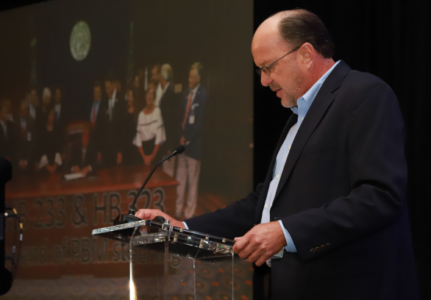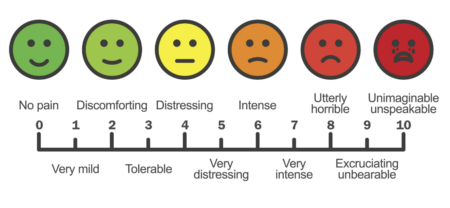Why grandpa should be mean, a new scale for pain, GPhA’s president-elect, and more
13 Mar 2020
Posted by Andrew Kantor
Davidson to be 2021-22 GPhA president
The GPhA Board of Directors has voted Covington pharmacist Mahlon Davidson as the next president-elect of the Georgia Pharmacy Association. Davidson will be sworn in as president-elect in June 2020 and will take the reins as president in June, 2021.
“For 34 years, I have had the pleasure of being a member of America’s strongest state pharmacy association,” said Davidson, who lives in Oxford. “This is now my opportunity to give back to the profession and to my fellow pharmacists by serving as an advocate, and an energetic representative of our rapidly changing professional environments.”

Quick facts:
- Davidson graduated from the University of Georgia College of Pharmacy in 1982.
- He’s been a GPhA member since 1985.
- He has served as a pharmacist in the Covington and Conyers communities for the past three decades.
- He has been at the Covington Kroger’s pharmacy for the past 20 years.
- A founding member of the Academy of Employee Pharmacists, he was named AEP’s 2003 Pharmacist of the Year.
Said GPhA CEO Bob Coleman, “Mahlon is a perfect choice to continue the line of GPhA volunteer leaders — he’s demonstrated time and again a strong commitment to his community and his patients. I look forward to working with him to improve healthcare choices and quality of life for patients in Georgia.”
Click here for the official press release.
Sticking it to tumors
Adding prochlorperazine to cancer treatments has a cool effect, say Aussie researchers: It alters the surface of the tumor cells to make it ‘stickier’ so anti-cancer drugs (avelumab, cetuximab, trastuzumab) are more effective.
“The result is that cancer cells become sitting targets that can no longer escape the immune system. It is almost as if the killer cells become zipped to the tumour cells.”
Wait, it gets better: Not only did this combo treatment eliminate all the head and neck tumors in mice, when they re-introduced the same cancer four weeks later, “Amazingly, their cancer was rapidly eliminated — as if the new combination, in addition to being more effective, was also able to teach the immune system how to better recognise cancer cells.”
Nice guys get Alzheimer’s?
Well, sort of: Apparently not being a nice person seems to offer some protection from dementia — so found Swiss scientists looking for ways “to limit the damage by acting on non-biological factors.”
The results are surprising: people who are unpleasant, who are not afraid of conflicts and who show a certain anti-conformity have better protected brains.
Tell us where it hurts
No longer will “My face hurts” be good enough. And forget about that cute little pain index you’ve probably seen:

Nope, at least when it comes to mouth, jaw, and face pain, researchers have come up with a ‘common language‘ to describe it. It’s 93 pages long, from “Pulpal pain attributed to hypersensitivity” to “Constant unilateral facial pain with additional attacks (CUFPA).”
Don’t give up that daily aspirin
Low-dose aspirin might be effective in preventing, or at least reducing, liver cancer. So say a team of researchers from Massachusetts and Sweden.
4.0% of patients who took low-dose aspirin (less than 163mg/day) and 8.3% of nonusers of aspirin developed liver cancer. Aspirin users had a 31% lower relative risk of developing liver cancer.
Coronavirus quotes…
“Everyone over 60 should become a hermit for a month.” — Former FDA commish Scott Gottlieb.
“We are deeply concerned both by the alarming levels of spread and severity and by the alarming levels of inaction.” WHO Director General Tedros Adhanom Ghebreyesus.
“We are flying blind.” —Illinois Rep. Mike Quigley on the lack of answers about coronavirus testing.
…and quick notes
- At least 31 cases in Georgia, and probably a lot more because…
- People can’t always get tested. There’s a shortage of tests, and healthcare facilities are sometimes refusing to give them if patients don’t meet certain criteria. Lawmakers are Not Pleased.
- The virus can live in the air (3 hours) and on surfaces (3 days).
- APhA has cancelled its annual meeting, which was scheduled for March 20–23. “[We’re] making plans to offer most of our educational content (CPE) online.”
- Florida gave pharmacists more power: The state legislature there voted to allow pharmacists to test patients for the flu and strep throat, treat those conditions, and also treat certain chronic medical conditions.
- The White House has temporarily banned travel to and from some parts of Europe. Health experts point out, though, that 1) the virus originated in Asia, and 2) it’s already established a foothold here, so the ban will have little or no effect.
- The virus is affecting pharmaceutical supplies. Even though most Chinese factories have reopened, the complexity of the supply chain means that medicines and ingredients are likely to be delayed moving through the system.
Who goes there?
Clearly having never read any science-fiction, researchers have now unearthed an entirely new strain of chlamydia bacteria from the depths of the Arctic ocean. And brought it up. And tried to grow more in the lab.
They have so far failed because “In the absence of a host organism, the team suspects they might ‘require compounds from other microbes living in the marine sediments’.”
In Act II, we assume they’ll go looking for that host organism.


